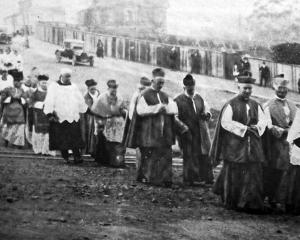Gun laws in New Zealand have for decades been a moving target - and an armour-plated one at that.
The protection comes both from the complexity of the law, and associated issues of cultural and social import, but also through the inability of our politicians to act decisively on the matter.
Resolve in this respect has been weakened by there being no consistent mandate to move radically in any particular direction.
But in the discussions of gun law and control following the murder of Senior Constable Len Snee by Jan Molenaar, shot with a .223 calibre rifle - just one of a reported cache of about 18 weapons illegally held by the late gunman - two points of note arise: guns of varying calibre and legality have proliferated in recent years, particularly among the criminal fraternity; and the internet has played a signifcant role in their distribution and accessibility.
It is illegal to sell weapons to a person who is not a licensed firearms holder, but in private internet transactions only the scruples of the vendor stand between a legal exchange and an illicit deal - and this represents a worrying loophole in the current control framework.
Ownership and use of firearms in New Zealand are governed through the Arms Act 1983, which was amended in 1992 after the Aramoana killings.
The 1983 Act removed gun registration - thought to be prohibitively expensive and ineffective - and instead introduced the licensing of users; except for about 4% of guns - namely automatic weapons and handguns.
Following the David Gray massacres at Aramoana in November 1990, the 1992 amendments banned so-called "Rambo-style" military weapons, introduced a new category of "military-style semi-automatic" which, like pistols, required a special endorsement, and limited licences to 10 years - at which point re-vetting would occur.
The last major address of gun laws was Sir Thomas Thorp's 1997 report - which followed an extensive review.
Among his recommendations were new restrictions on legal gun ownership, including the controversial reintroduction of gun registration.
The National government in 1999 introduced an Arms Amendment (No 2) Bill to implement the recommendations, subsequently taken up by the Labour government that assumed office that same year.
But following the torrent of submissions made against the Bill when it was in select committee, the Government substantially parked the changes.
A further amended Bill went back to select committee in 2005, where it has remained in limbo ever since.
Prime Minister John Key, Police Minister Judith Collins and Labour leader Phil Goff are all entertaining the possibility that aspects of the laws may need to be revisited - at least with respect to the ease of access.
Predictably, in the tense and emotional aftermath of the Napier shootings, lobbyists have made calls for more far-reaching moves, including a reversion to registration.
It is, however, 12 years now since Sir Thomas Thorp made that recommendation, and 26 years since registration ceased to be the practice in this country.
In that time, the number of guns has multiplied almost exponentially.
Locating them all and mustering them through a registration process would be an all but impossible and arguably futile process.
The majority of law-abiding and responsible gun owners would fall into line - but the very people such initiatives are aimed at would avoid complying, either by simply stashing their weaponry or by neglecting to come forward.
As Mr Goff himself said this week, "the horse has bolted".
Gun ownership in New Zealand is not a cakewalk.
Licences are issued only after rigorous examination of a candidate's suitability, including mental health screening, interviews with family members or relatives, and inspection of the household security storage facilities.
There are thought to be about 225,000 licensed firearms owners in the country, with about 1.2 million guns.
Unfortunately, when it comes to regulation, there is no foolproof mechanism to prevent dangerous people from obtaining licences, and unsuitable persons can and will continue to access firearms illegally.
But this remains a target at which the most fruitful efforts can perhaps be aimed: Mrs Collins this week noted that she would be asking police to consider the issue of online gun sales.
The logic is plausible.
For while it is impossible to legislate for human behaviour, there are perfectly effective laws controlling the sale of various other goods and there must be methods at least to make it harder for lethal weapons to fall into the wrong hands.
Asserting greater control over internet sales would certainly be a good place to start.












